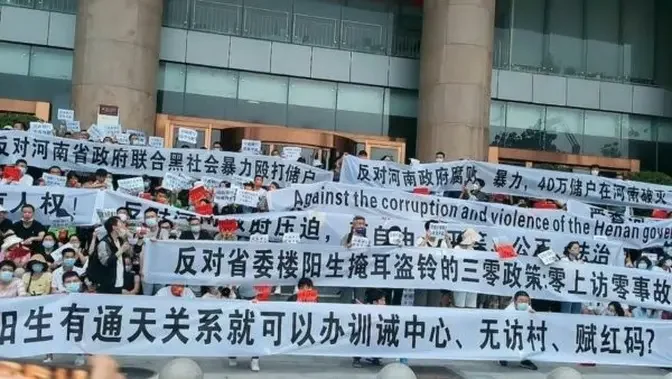A tightening of financial regulations in mainland China has many on edge as more people report experiences of accounts being seized without notice, fraudulent activity, and suspicious financial transactions.
The incidents suggest broader economic distress within the country as Beijing tries to revamp a sputtering banking sector by resorting to predatory lending practices that include the promise of high-interest rates in hopes of attracting new customers.
Meanwhile, facing tightened controls and opaque behavior by financial institutions, many Chinese depositors have taken to so-called “special forces-style” banking tactics to navigate the often-antagonistic environment, where one’s savings can depreciate, be frozen, or flat-out vanish if placed in the wrong hands.
Moreover, the country’s banking procedures have seen a notable increase in their complexity — with transactional thresholds being escalated and withdrawals requiring extended processing periods — sometimes stretching over several days.
As individuals make efforts to withdraw funds from ATMs, they are now subjected to a waiting period of at least one hour, and are required to receive approval from security personnel prior to accessing banking facilities for their transactions.

In recent years, news concerning China’s major banks, such as “difficulties withdrawing money,” “frozen bank accounts,” and “difficulties repaying loans early,” have become frequent hot searches on China’s web.
RELATED: China Shifts Focus to Domestic Demand and Green Tech Opportunities Amid Export Downturn
Banking blunders
According to a report by Radio Free Asia (RFA), in the metropolis of Shenzhen, many Hong Kong residents resort to the Bank of China, China Construction Bank, and the Industrial and Commercial Bank of China (ICBC) as preferred banking institutions. These establishments are regularly bustling with patrons and are heavily guarded by security personnel equipped with batons and shields positioned in the vicinity.
Now, in order to manage crowds within the premises, seating has been restricted to a set number of fixed chairs, customers are mandated to form queues, and entry without an invitation is prohibited. An advisory notice placed outside a branch of the Bank of China stated a waiting time of approximately four to five hours.

“Even if you made an appointment, you still need to wait in line,” a security guard outside the bank was heard telling patrons. “That’s the rule.”
Furthermore, the Bank of China now requires an advance appointment for withdrawals exceeding 200,000 yuan (about US$28,000), though rules vary by bank and branch. Withdrawals over 20,000 yuan (approximately US$2,800) also require an appointment — and customers often have to wait several hours to access their funds.
Chinese customs also restrict the outflow of more than 20,000 yuan in cash or wire transfers from the country. Thus, to access their mainland savings, many Hong Kong residents are sending retired family members to withdraw the maximum amount everyday in a process that takes at least one hour to complete.
On the brink of disaster
To make matters worse, Hong Kong customers also face the risk of account freezes on suspicion of fraud — even for ordinary transactions or bill payments. One resident said he had his account savings frozen after sending 5,000 yuan (US$700) to his mother. Even regular payments were flagged as “illicit funds,” and it took him days of complaints at several branches to have his account reinstated, RFA reports.
Hong Kong’s government, which has shown an increased allegiance to the Chinese Communist Party (CCP), has been prompting its citizens to invest in Guangdong’s Greater Bay Area — aiming to repatriate Hong Kong’s Cantonese-speaking capital to the mainland. However, current policies are restricting them from being able to conduct normal banking transactions.
RELATED: Biden Will Ban Hong Kong Leader John Lee From San Francisco APEC Summit
Vanishing funds
Village banks in China’s Henan and Anhui provinces have also experienced financial difficulties in recent years — with nearly 400,000 customers unable to retrieve their savings — triggering several rounds of large-scale protests. A year later, the victims are still unable to get their money back.

MORE ON THIS: Chinese Protesting Frozen Bank Accounts Just the Tip of the Iceberg in Beijing’s Widening Financial Crisis
Reports of disappearing customer deposits have also become increasingly common in China’s state-owned and village banks. In May 2023, Chinese online media giant Sohu reported that customers’ funds were vanishing from the Construction Bank of China and the Agricultural Bank of China.
In 2022, the Nanning branch of the ICBC saw over 250 million yuan (about USD$35 million) in deposits from 28 customers disappear, and nearly $42 million in certificates of deposit mysteriously vanished from the Citic Bank.
Customers react
At the Bank of China, a conversation between a male customer trying to schedule an appointment to withdraw a large amount of cash and a bank clerk shows his difficulties. According to the man’s account, customers are allowed to deposit money immediately, but it takes many days to withdraw. When he tried to film his interaction with the clerk to show his predicament, the manager prevented him from doing so.
Other instances include a business owner who found her account — previously containing 10.8 million yuan ($1.59 million) — depleted to just 124 yuan ($18), and a Shandong province resident whose $140,000 deposit was reduced to merely 1 yuan (14 US cents) in the span of five years.
“They told me there was an issue with my funds,” one customer told RFA after trying to withdraw funds at the Bank of China in Shenzhen. “The policy in mainland China is such that they would even freeze an account with 4,000 [about US$560] yuan in it.”
“We’re talking the kind of money you could get through in a day, and they’re still holding it up,” the customer said. “The details don’t match up.”